Criminal Law Project: In-depth Analysis of Criminal Cases
VerifiedAdded on 2021/02/20
|9
|2582
|47
Project
AI Summary
This project delves into the intricacies of criminal law through the analysis of two distinct case scenarios. The first case involves a man accused of attempted murder under the Criminal Attempts Act 1981, examining the legal procedures, including the roles of magistrates and the Crown Court, the determination of guilt or innocence, and the application of Actus Reus. The second case presents a dispute between a separated couple concerning child visitation and a wrongful dismissal, exploring the best methods of dispute resolution, such as negotiation, consultation with a lawyer, and filing a writ, along with the advantages and disadvantages of each approach. The project concludes with a reflection on the knowledge gained about legal processes and the importance of understanding legal frameworks in various contexts, including the workplace.
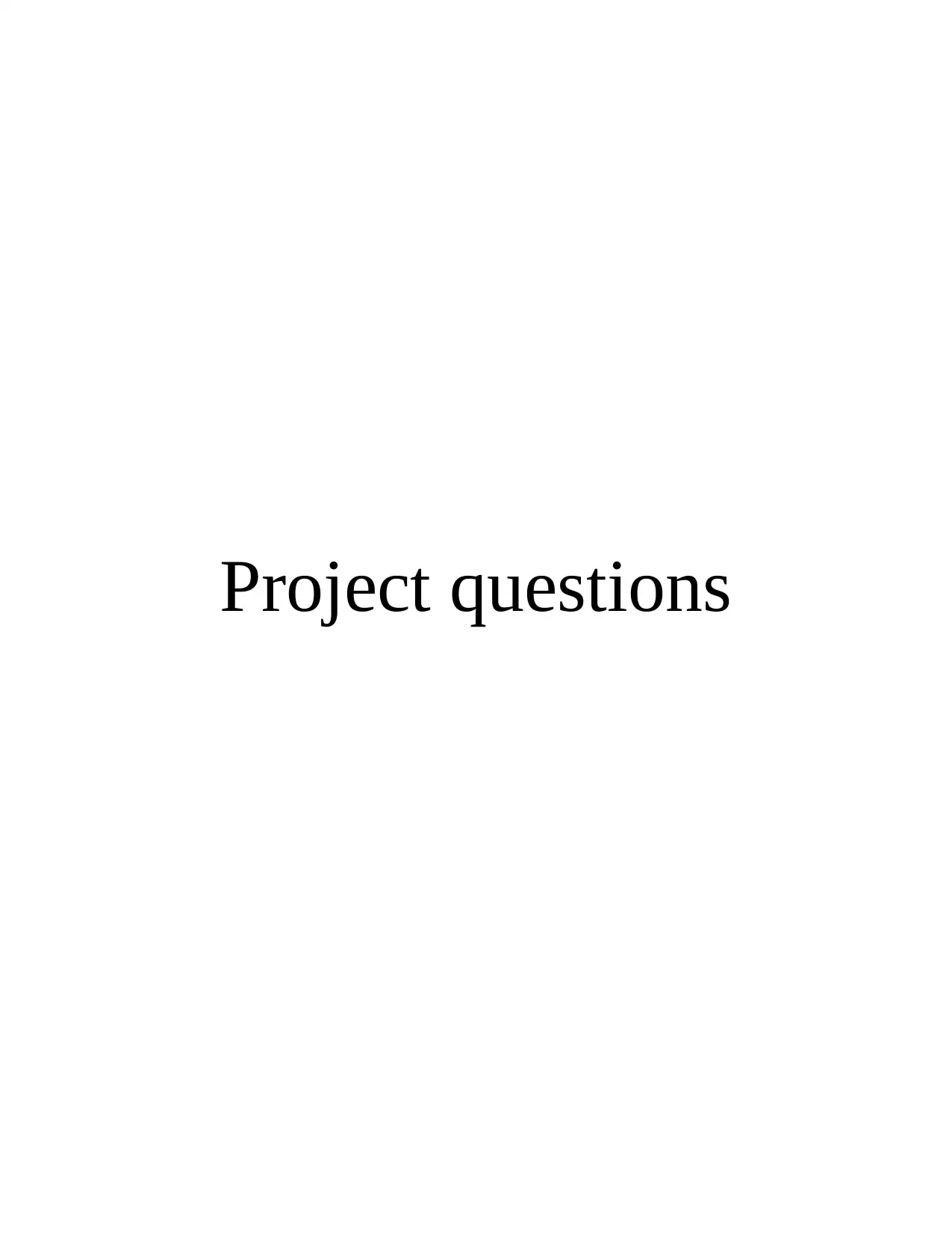
Project questions
Paraphrase This Document
Need a fresh take? Get an instant paraphrase of this document with our AI Paraphraser
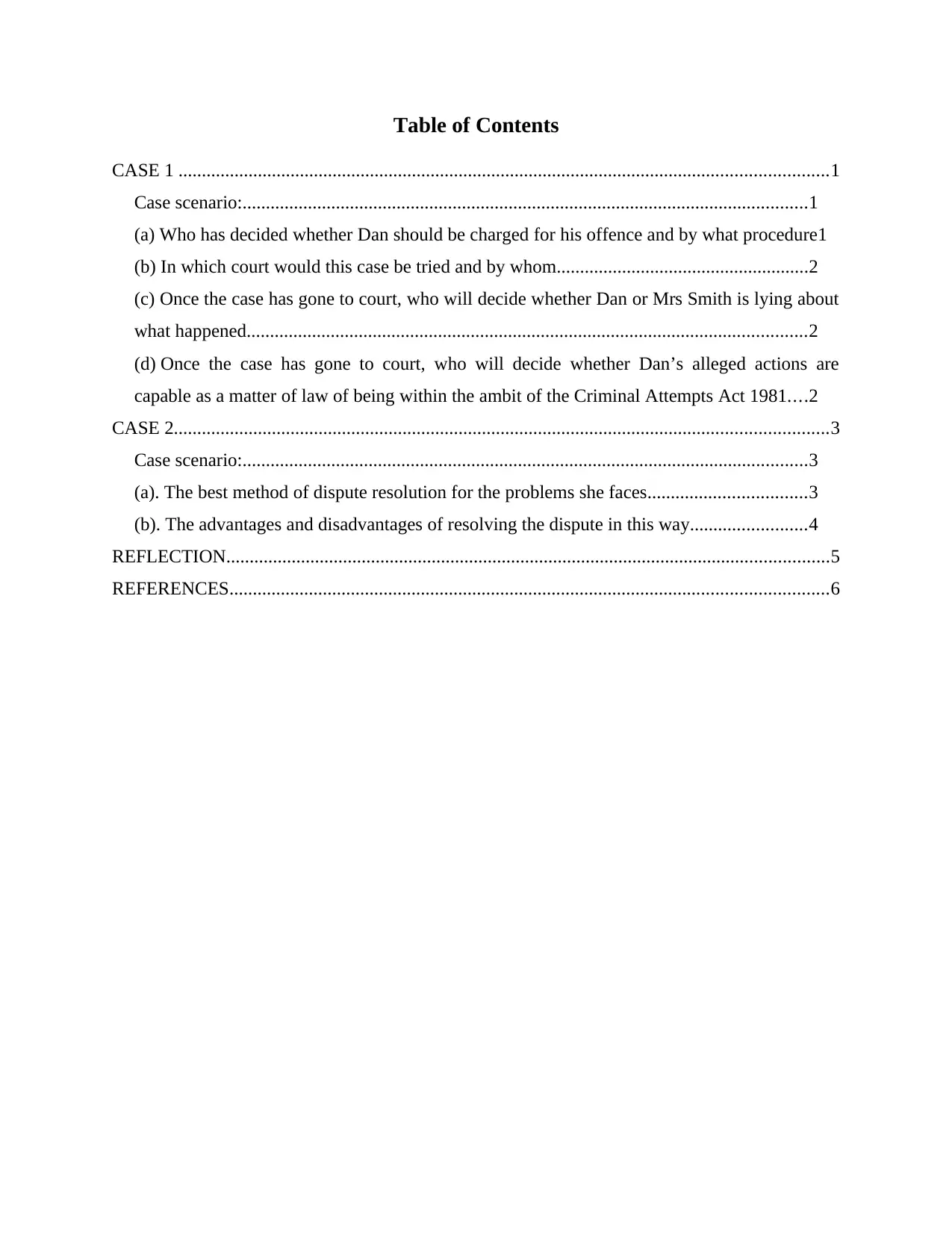
Table of Contents
CASE 1 ...........................................................................................................................................1
Case scenario:.........................................................................................................................1
(a) Who has decided whether Dan should be charged for his offence and by what procedure1
(b) In which court would this case be tried and by whom......................................................2
(c) Once the case has gone to court, who will decide whether Dan or Mrs Smith is lying about
what happened........................................................................................................................2
(d) Once the case has gone to court, who will decide whether Dan’s alleged actions are
capable as a matter of law of being within the ambit of the Criminal Attempts Act 1981....2
CASE 2............................................................................................................................................3
Case scenario:.........................................................................................................................3
(a). The best method of dispute resolution for the problems she faces..................................3
(b). The advantages and disadvantages of resolving the dispute in this way.........................4
REFLECTION.................................................................................................................................5
REFERENCES................................................................................................................................6
CASE 1 ...........................................................................................................................................1
Case scenario:.........................................................................................................................1
(a) Who has decided whether Dan should be charged for his offence and by what procedure1
(b) In which court would this case be tried and by whom......................................................2
(c) Once the case has gone to court, who will decide whether Dan or Mrs Smith is lying about
what happened........................................................................................................................2
(d) Once the case has gone to court, who will decide whether Dan’s alleged actions are
capable as a matter of law of being within the ambit of the Criminal Attempts Act 1981....2
CASE 2............................................................................................................................................3
Case scenario:.........................................................................................................................3
(a). The best method of dispute resolution for the problems she faces..................................3
(b). The advantages and disadvantages of resolving the dispute in this way.........................4
REFLECTION.................................................................................................................................5
REFERENCES................................................................................................................................6

⊘ This is a preview!⊘
Do you want full access?
Subscribe today to unlock all pages.

Trusted by 1+ million students worldwide
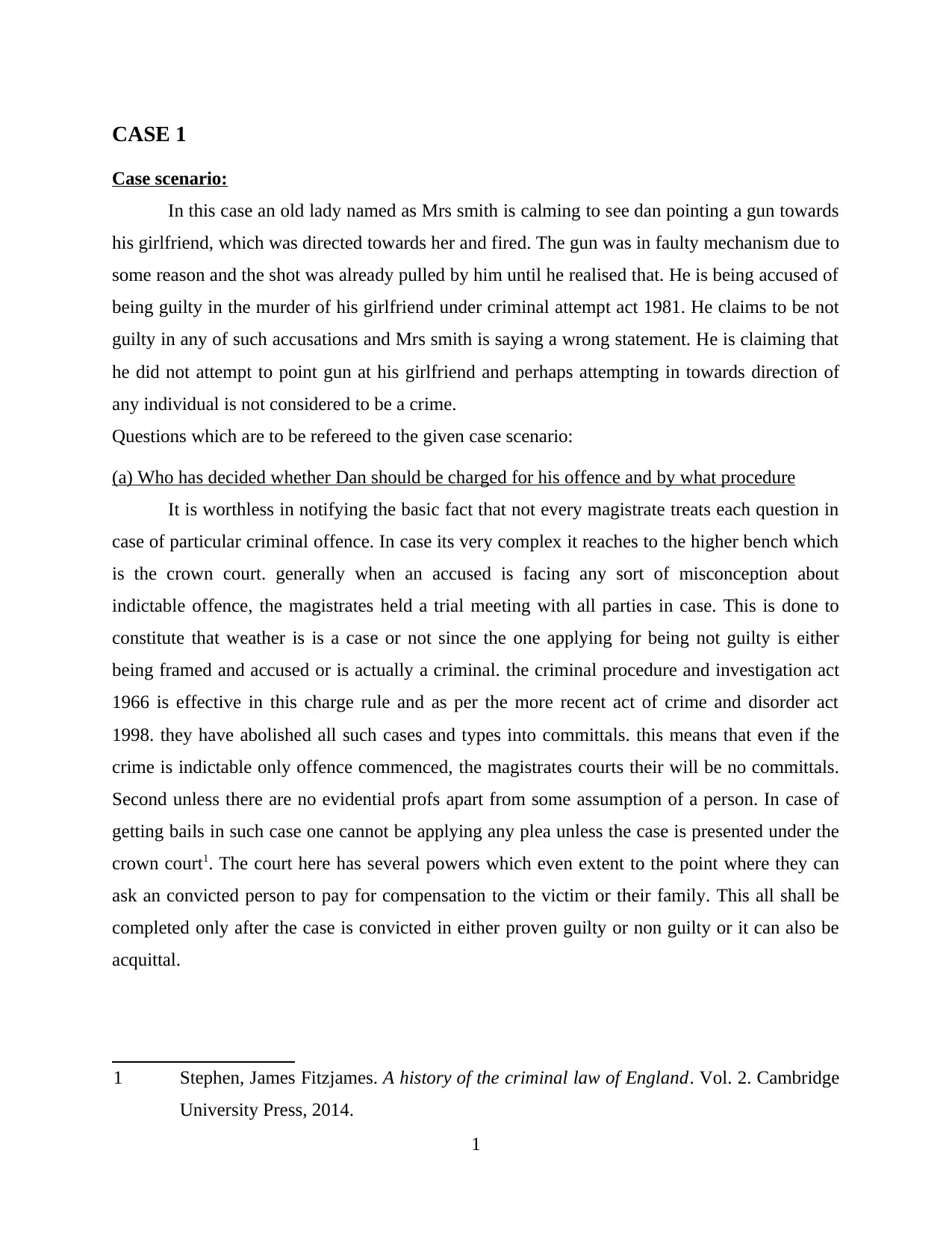
CASE 1
Case scenario:
In this case an old lady named as Mrs smith is calming to see dan pointing a gun towards
his girlfriend, which was directed towards her and fired. The gun was in faulty mechanism due to
some reason and the shot was already pulled by him until he realised that. He is being accused of
being guilty in the murder of his girlfriend under criminal attempt act 1981. He claims to be not
guilty in any of such accusations and Mrs smith is saying a wrong statement. He is claiming that
he did not attempt to point gun at his girlfriend and perhaps attempting in towards direction of
any individual is not considered to be a crime.
Questions which are to be refereed to the given case scenario:
(a) Who has decided whether Dan should be charged for his offence and by what procedure
It is worthless in notifying the basic fact that not every magistrate treats each question in
case of particular criminal offence. In case its very complex it reaches to the higher bench which
is the crown court. generally when an accused is facing any sort of misconception about
indictable offence, the magistrates held a trial meeting with all parties in case. This is done to
constitute that weather is is a case or not since the one applying for being not guilty is either
being framed and accused or is actually a criminal. the criminal procedure and investigation act
1966 is effective in this charge rule and as per the more recent act of crime and disorder act
1998. they have abolished all such cases and types into committals. this means that even if the
crime is indictable only offence commenced, the magistrates courts their will be no committals.
Second unless there are no evidential profs apart from some assumption of a person. In case of
getting bails in such case one cannot be applying any plea unless the case is presented under the
crown court1. The court here has several powers which even extent to the point where they can
ask an convicted person to pay for compensation to the victim or their family. This all shall be
completed only after the case is convicted in either proven guilty or non guilty or it can also be
acquittal.
1 Stephen, James Fitzjames. A history of the criminal law of England. Vol. 2. Cambridge
University Press, 2014.
1
Case scenario:
In this case an old lady named as Mrs smith is calming to see dan pointing a gun towards
his girlfriend, which was directed towards her and fired. The gun was in faulty mechanism due to
some reason and the shot was already pulled by him until he realised that. He is being accused of
being guilty in the murder of his girlfriend under criminal attempt act 1981. He claims to be not
guilty in any of such accusations and Mrs smith is saying a wrong statement. He is claiming that
he did not attempt to point gun at his girlfriend and perhaps attempting in towards direction of
any individual is not considered to be a crime.
Questions which are to be refereed to the given case scenario:
(a) Who has decided whether Dan should be charged for his offence and by what procedure
It is worthless in notifying the basic fact that not every magistrate treats each question in
case of particular criminal offence. In case its very complex it reaches to the higher bench which
is the crown court. generally when an accused is facing any sort of misconception about
indictable offence, the magistrates held a trial meeting with all parties in case. This is done to
constitute that weather is is a case or not since the one applying for being not guilty is either
being framed and accused or is actually a criminal. the criminal procedure and investigation act
1966 is effective in this charge rule and as per the more recent act of crime and disorder act
1998. they have abolished all such cases and types into committals. this means that even if the
crime is indictable only offence commenced, the magistrates courts their will be no committals.
Second unless there are no evidential profs apart from some assumption of a person. In case of
getting bails in such case one cannot be applying any plea unless the case is presented under the
crown court1. The court here has several powers which even extent to the point where they can
ask an convicted person to pay for compensation to the victim or their family. This all shall be
completed only after the case is convicted in either proven guilty or non guilty or it can also be
acquittal.
1 Stephen, James Fitzjames. A history of the criminal law of England. Vol. 2. Cambridge
University Press, 2014.
1
Paraphrase This Document
Need a fresh take? Get an instant paraphrase of this document with our AI Paraphraser
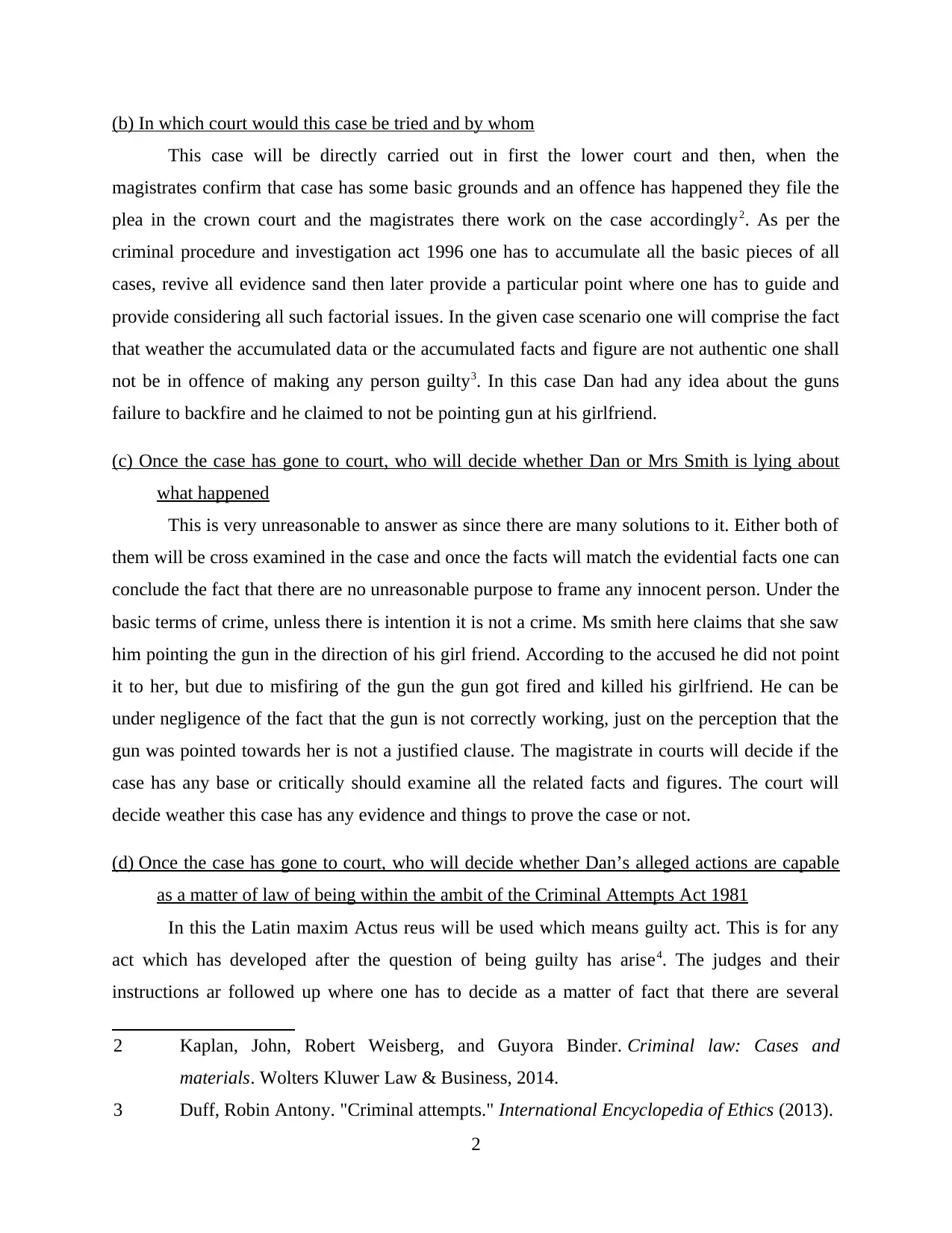
(b) In which court would this case be tried and by whom
This case will be directly carried out in first the lower court and then, when the
magistrates confirm that case has some basic grounds and an offence has happened they file the
plea in the crown court and the magistrates there work on the case accordingly2. As per the
criminal procedure and investigation act 1996 one has to accumulate all the basic pieces of all
cases, revive all evidence sand then later provide a particular point where one has to guide and
provide considering all such factorial issues. In the given case scenario one will comprise the fact
that weather the accumulated data or the accumulated facts and figure are not authentic one shall
not be in offence of making any person guilty3. In this case Dan had any idea about the guns
failure to backfire and he claimed to not be pointing gun at his girlfriend.
(c) Once the case has gone to court, who will decide whether Dan or Mrs Smith is lying about
what happened
This is very unreasonable to answer as since there are many solutions to it. Either both of
them will be cross examined in the case and once the facts will match the evidential facts one can
conclude the fact that there are no unreasonable purpose to frame any innocent person. Under the
basic terms of crime, unless there is intention it is not a crime. Ms smith here claims that she saw
him pointing the gun in the direction of his girl friend. According to the accused he did not point
it to her, but due to misfiring of the gun the gun got fired and killed his girlfriend. He can be
under negligence of the fact that the gun is not correctly working, just on the perception that the
gun was pointed towards her is not a justified clause. The magistrate in courts will decide if the
case has any base or critically should examine all the related facts and figures. The court will
decide weather this case has any evidence and things to prove the case or not.
(d) Once the case has gone to court, who will decide whether Dan’s alleged actions are capable
as a matter of law of being within the ambit of the Criminal Attempts Act 1981
In this the Latin maxim Actus reus will be used which means guilty act. This is for any
act which has developed after the question of being guilty has arise4. The judges and their
instructions ar followed up where one has to decide as a matter of fact that there are several
2 Kaplan, John, Robert Weisberg, and Guyora Binder. Criminal law: Cases and
materials. Wolters Kluwer Law & Business, 2014.
3 Duff, Robin Antony. "Criminal attempts." International Encyclopedia of Ethics (2013).
2
This case will be directly carried out in first the lower court and then, when the
magistrates confirm that case has some basic grounds and an offence has happened they file the
plea in the crown court and the magistrates there work on the case accordingly2. As per the
criminal procedure and investigation act 1996 one has to accumulate all the basic pieces of all
cases, revive all evidence sand then later provide a particular point where one has to guide and
provide considering all such factorial issues. In the given case scenario one will comprise the fact
that weather the accumulated data or the accumulated facts and figure are not authentic one shall
not be in offence of making any person guilty3. In this case Dan had any idea about the guns
failure to backfire and he claimed to not be pointing gun at his girlfriend.
(c) Once the case has gone to court, who will decide whether Dan or Mrs Smith is lying about
what happened
This is very unreasonable to answer as since there are many solutions to it. Either both of
them will be cross examined in the case and once the facts will match the evidential facts one can
conclude the fact that there are no unreasonable purpose to frame any innocent person. Under the
basic terms of crime, unless there is intention it is not a crime. Ms smith here claims that she saw
him pointing the gun in the direction of his girl friend. According to the accused he did not point
it to her, but due to misfiring of the gun the gun got fired and killed his girlfriend. He can be
under negligence of the fact that the gun is not correctly working, just on the perception that the
gun was pointed towards her is not a justified clause. The magistrate in courts will decide if the
case has any base or critically should examine all the related facts and figures. The court will
decide weather this case has any evidence and things to prove the case or not.
(d) Once the case has gone to court, who will decide whether Dan’s alleged actions are capable
as a matter of law of being within the ambit of the Criminal Attempts Act 1981
In this the Latin maxim Actus reus will be used which means guilty act. This is for any
act which has developed after the question of being guilty has arise4. The judges and their
instructions ar followed up where one has to decide as a matter of fact that there are several
2 Kaplan, John, Robert Weisberg, and Guyora Binder. Criminal law: Cases and
materials. Wolters Kluwer Law & Business, 2014.
3 Duff, Robin Antony. "Criminal attempts." International Encyclopedia of Ethics (2013).
2
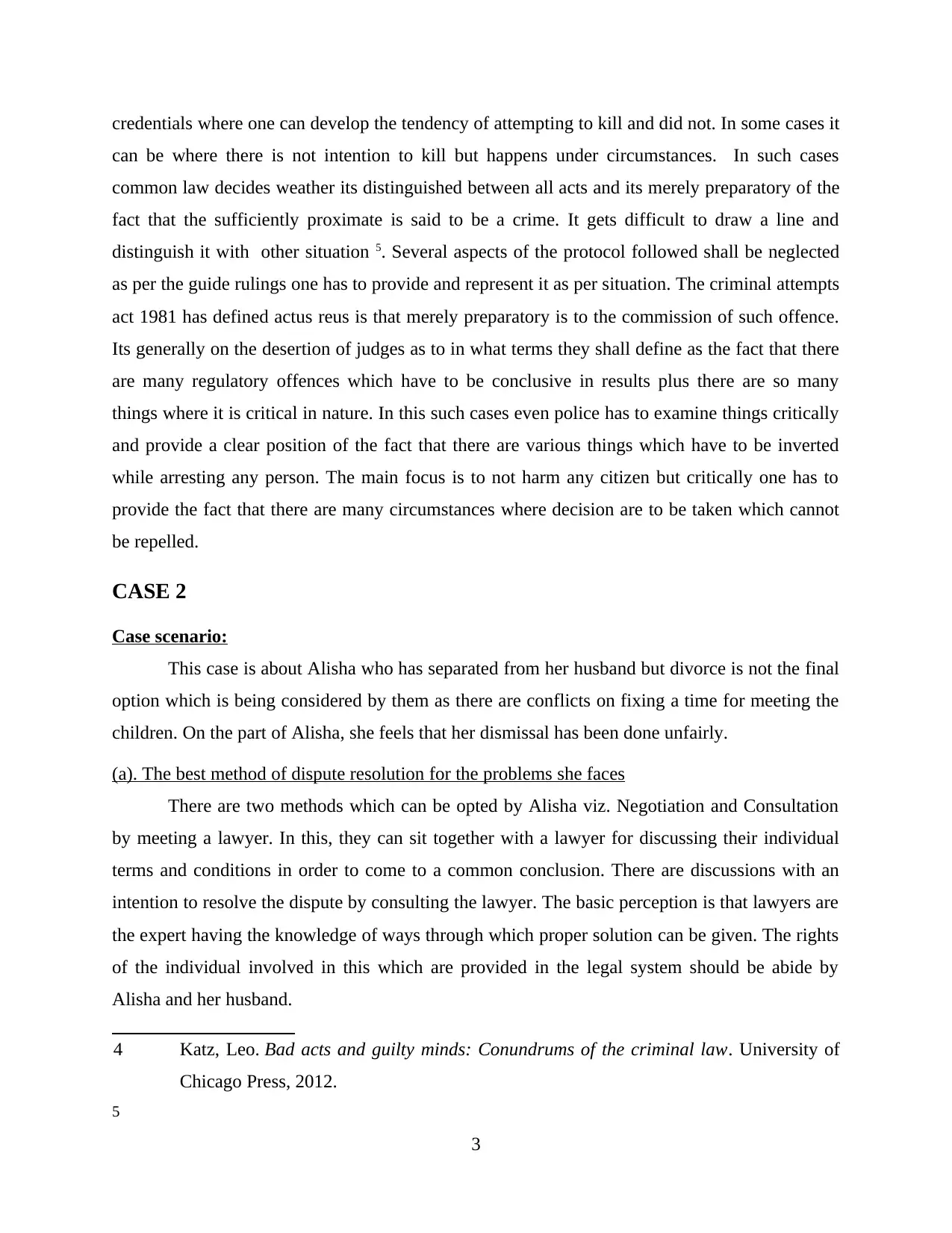
credentials where one can develop the tendency of attempting to kill and did not. In some cases it
can be where there is not intention to kill but happens under circumstances. In such cases
common law decides weather its distinguished between all acts and its merely preparatory of the
fact that the sufficiently proximate is said to be a crime. It gets difficult to draw a line and
distinguish it with other situation 5. Several aspects of the protocol followed shall be neglected
as per the guide rulings one has to provide and represent it as per situation. The criminal attempts
act 1981 has defined actus reus is that merely preparatory is to the commission of such offence.
Its generally on the desertion of judges as to in what terms they shall define as the fact that there
are many regulatory offences which have to be conclusive in results plus there are so many
things where it is critical in nature. In this such cases even police has to examine things critically
and provide a clear position of the fact that there are various things which have to be inverted
while arresting any person. The main focus is to not harm any citizen but critically one has to
provide the fact that there are many circumstances where decision are to be taken which cannot
be repelled.
CASE 2
Case scenario:
This case is about Alisha who has separated from her husband but divorce is not the final
option which is being considered by them as there are conflicts on fixing a time for meeting the
children. On the part of Alisha, she feels that her dismissal has been done unfairly.
(a). The best method of dispute resolution for the problems she faces
There are two methods which can be opted by Alisha viz. Negotiation and Consultation
by meeting a lawyer. In this, they can sit together with a lawyer for discussing their individual
terms and conditions in order to come to a common conclusion. There are discussions with an
intention to resolve the dispute by consulting the lawyer. The basic perception is that lawyers are
the expert having the knowledge of ways through which proper solution can be given. The rights
of the individual involved in this which are provided in the legal system should be abide by
Alisha and her husband.
4 Katz, Leo. Bad acts and guilty minds: Conundrums of the criminal law. University of
Chicago Press, 2012.
5
3
can be where there is not intention to kill but happens under circumstances. In such cases
common law decides weather its distinguished between all acts and its merely preparatory of the
fact that the sufficiently proximate is said to be a crime. It gets difficult to draw a line and
distinguish it with other situation 5. Several aspects of the protocol followed shall be neglected
as per the guide rulings one has to provide and represent it as per situation. The criminal attempts
act 1981 has defined actus reus is that merely preparatory is to the commission of such offence.
Its generally on the desertion of judges as to in what terms they shall define as the fact that there
are many regulatory offences which have to be conclusive in results plus there are so many
things where it is critical in nature. In this such cases even police has to examine things critically
and provide a clear position of the fact that there are various things which have to be inverted
while arresting any person. The main focus is to not harm any citizen but critically one has to
provide the fact that there are many circumstances where decision are to be taken which cannot
be repelled.
CASE 2
Case scenario:
This case is about Alisha who has separated from her husband but divorce is not the final
option which is being considered by them as there are conflicts on fixing a time for meeting the
children. On the part of Alisha, she feels that her dismissal has been done unfairly.
(a). The best method of dispute resolution for the problems she faces
There are two methods which can be opted by Alisha viz. Negotiation and Consultation
by meeting a lawyer. In this, they can sit together with a lawyer for discussing their individual
terms and conditions in order to come to a common conclusion. There are discussions with an
intention to resolve the dispute by consulting the lawyer. The basic perception is that lawyers are
the expert having the knowledge of ways through which proper solution can be given. The rights
of the individual involved in this which are provided in the legal system should be abide by
Alisha and her husband.
4 Katz, Leo. Bad acts and guilty minds: Conundrums of the criminal law. University of
Chicago Press, 2012.
5
3
⊘ This is a preview!⊘
Do you want full access?
Subscribe today to unlock all pages.

Trusted by 1+ million students worldwide
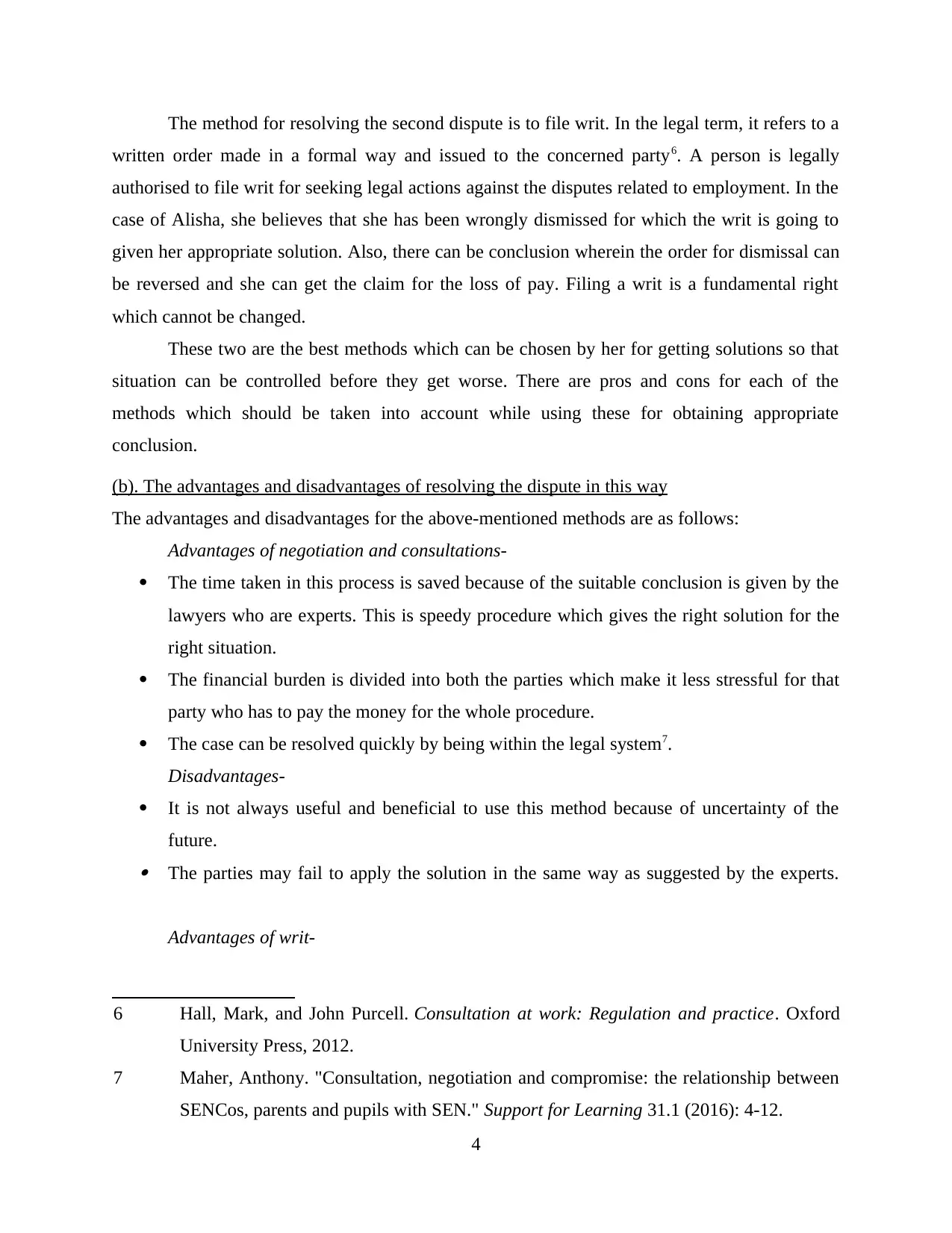
The method for resolving the second dispute is to file writ. In the legal term, it refers to a
written order made in a formal way and issued to the concerned party6. A person is legally
authorised to file writ for seeking legal actions against the disputes related to employment. In the
case of Alisha, she believes that she has been wrongly dismissed for which the writ is going to
given her appropriate solution. Also, there can be conclusion wherein the order for dismissal can
be reversed and she can get the claim for the loss of pay. Filing a writ is a fundamental right
which cannot be changed.
These two are the best methods which can be chosen by her for getting solutions so that
situation can be controlled before they get worse. There are pros and cons for each of the
methods which should be taken into account while using these for obtaining appropriate
conclusion.
(b). The advantages and disadvantages of resolving the dispute in this way
The advantages and disadvantages for the above-mentioned methods are as follows:
Advantages of negotiation and consultations-
The time taken in this process is saved because of the suitable conclusion is given by the
lawyers who are experts. This is speedy procedure which gives the right solution for the
right situation.
The financial burden is divided into both the parties which make it less stressful for that
party who has to pay the money for the whole procedure.
The case can be resolved quickly by being within the legal system7.
Disadvantages-
It is not always useful and beneficial to use this method because of uncertainty of the
future. The parties may fail to apply the solution in the same way as suggested by the experts.
Advantages of writ-
6 Hall, Mark, and John Purcell. Consultation at work: Regulation and practice. Oxford
University Press, 2012.
7 Maher, Anthony. "Consultation, negotiation and compromise: the relationship between
SENCos, parents and pupils with SEN." Support for Learning 31.1 (2016): 4-12.
4
written order made in a formal way and issued to the concerned party6. A person is legally
authorised to file writ for seeking legal actions against the disputes related to employment. In the
case of Alisha, she believes that she has been wrongly dismissed for which the writ is going to
given her appropriate solution. Also, there can be conclusion wherein the order for dismissal can
be reversed and she can get the claim for the loss of pay. Filing a writ is a fundamental right
which cannot be changed.
These two are the best methods which can be chosen by her for getting solutions so that
situation can be controlled before they get worse. There are pros and cons for each of the
methods which should be taken into account while using these for obtaining appropriate
conclusion.
(b). The advantages and disadvantages of resolving the dispute in this way
The advantages and disadvantages for the above-mentioned methods are as follows:
Advantages of negotiation and consultations-
The time taken in this process is saved because of the suitable conclusion is given by the
lawyers who are experts. This is speedy procedure which gives the right solution for the
right situation.
The financial burden is divided into both the parties which make it less stressful for that
party who has to pay the money for the whole procedure.
The case can be resolved quickly by being within the legal system7.
Disadvantages-
It is not always useful and beneficial to use this method because of uncertainty of the
future. The parties may fail to apply the solution in the same way as suggested by the experts.
Advantages of writ-
6 Hall, Mark, and John Purcell. Consultation at work: Regulation and practice. Oxford
University Press, 2012.
7 Maher, Anthony. "Consultation, negotiation and compromise: the relationship between
SENCos, parents and pupils with SEN." Support for Learning 31.1 (2016): 4-12.
4
Paraphrase This Document
Need a fresh take? Get an instant paraphrase of this document with our AI Paraphraser
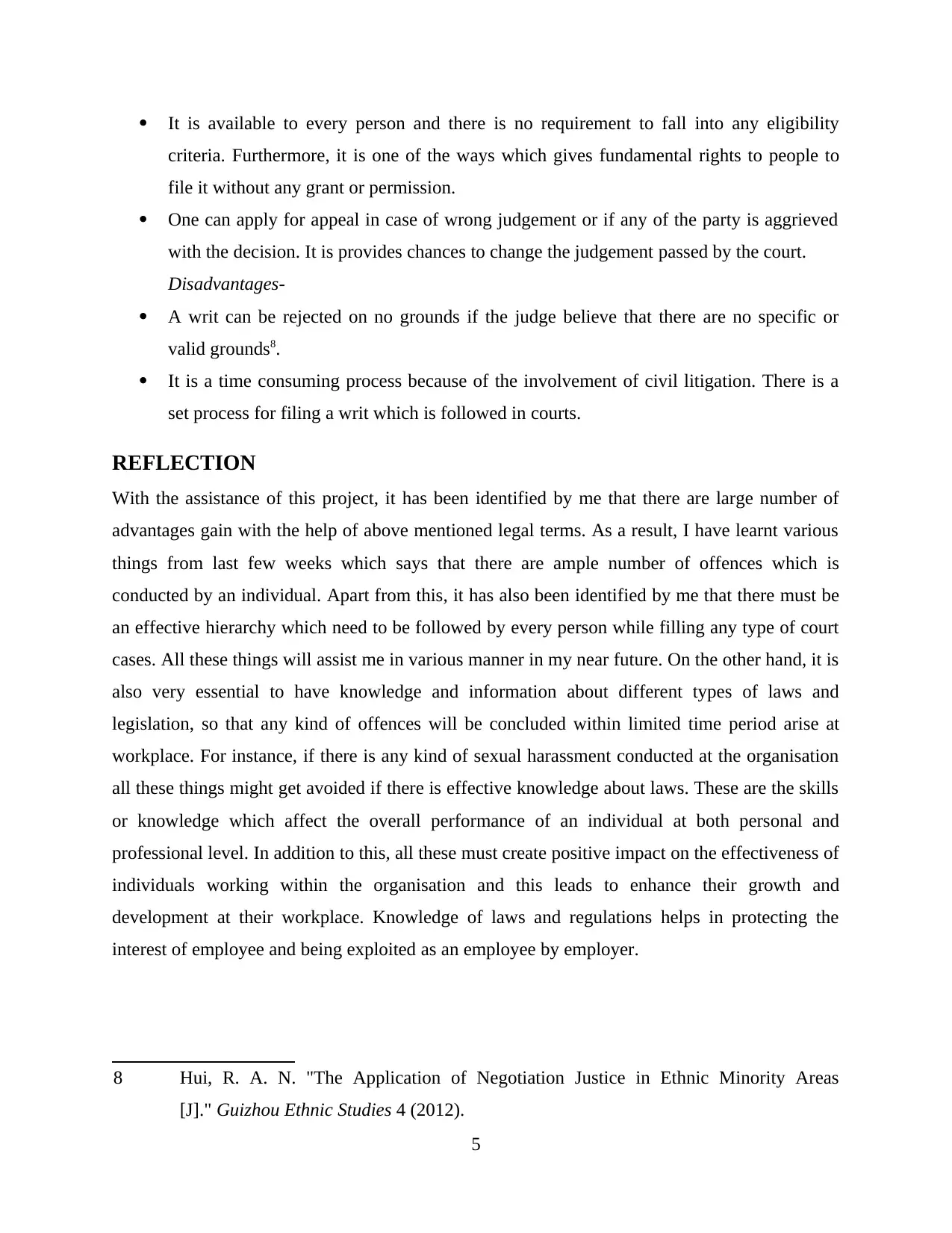
It is available to every person and there is no requirement to fall into any eligibility
criteria. Furthermore, it is one of the ways which gives fundamental rights to people to
file it without any grant or permission.
One can apply for appeal in case of wrong judgement or if any of the party is aggrieved
with the decision. It is provides chances to change the judgement passed by the court.
Disadvantages-
A writ can be rejected on no grounds if the judge believe that there are no specific or
valid grounds8.
It is a time consuming process because of the involvement of civil litigation. There is a
set process for filing a writ which is followed in courts.
REFLECTION
With the assistance of this project, it has been identified by me that there are large number of
advantages gain with the help of above mentioned legal terms. As a result, I have learnt various
things from last few weeks which says that there are ample number of offences which is
conducted by an individual. Apart from this, it has also been identified by me that there must be
an effective hierarchy which need to be followed by every person while filling any type of court
cases. All these things will assist me in various manner in my near future. On the other hand, it is
also very essential to have knowledge and information about different types of laws and
legislation, so that any kind of offences will be concluded within limited time period arise at
workplace. For instance, if there is any kind of sexual harassment conducted at the organisation
all these things might get avoided if there is effective knowledge about laws. These are the skills
or knowledge which affect the overall performance of an individual at both personal and
professional level. In addition to this, all these must create positive impact on the effectiveness of
individuals working within the organisation and this leads to enhance their growth and
development at their workplace. Knowledge of laws and regulations helps in protecting the
interest of employee and being exploited as an employee by employer.
8 Hui, R. A. N. "The Application of Negotiation Justice in Ethnic Minority Areas
[J]." Guizhou Ethnic Studies 4 (2012).
5
criteria. Furthermore, it is one of the ways which gives fundamental rights to people to
file it without any grant or permission.
One can apply for appeal in case of wrong judgement or if any of the party is aggrieved
with the decision. It is provides chances to change the judgement passed by the court.
Disadvantages-
A writ can be rejected on no grounds if the judge believe that there are no specific or
valid grounds8.
It is a time consuming process because of the involvement of civil litigation. There is a
set process for filing a writ which is followed in courts.
REFLECTION
With the assistance of this project, it has been identified by me that there are large number of
advantages gain with the help of above mentioned legal terms. As a result, I have learnt various
things from last few weeks which says that there are ample number of offences which is
conducted by an individual. Apart from this, it has also been identified by me that there must be
an effective hierarchy which need to be followed by every person while filling any type of court
cases. All these things will assist me in various manner in my near future. On the other hand, it is
also very essential to have knowledge and information about different types of laws and
legislation, so that any kind of offences will be concluded within limited time period arise at
workplace. For instance, if there is any kind of sexual harassment conducted at the organisation
all these things might get avoided if there is effective knowledge about laws. These are the skills
or knowledge which affect the overall performance of an individual at both personal and
professional level. In addition to this, all these must create positive impact on the effectiveness of
individuals working within the organisation and this leads to enhance their growth and
development at their workplace. Knowledge of laws and regulations helps in protecting the
interest of employee and being exploited as an employee by employer.
8 Hui, R. A. N. "The Application of Negotiation Justice in Ethnic Minority Areas
[J]." Guizhou Ethnic Studies 4 (2012).
5
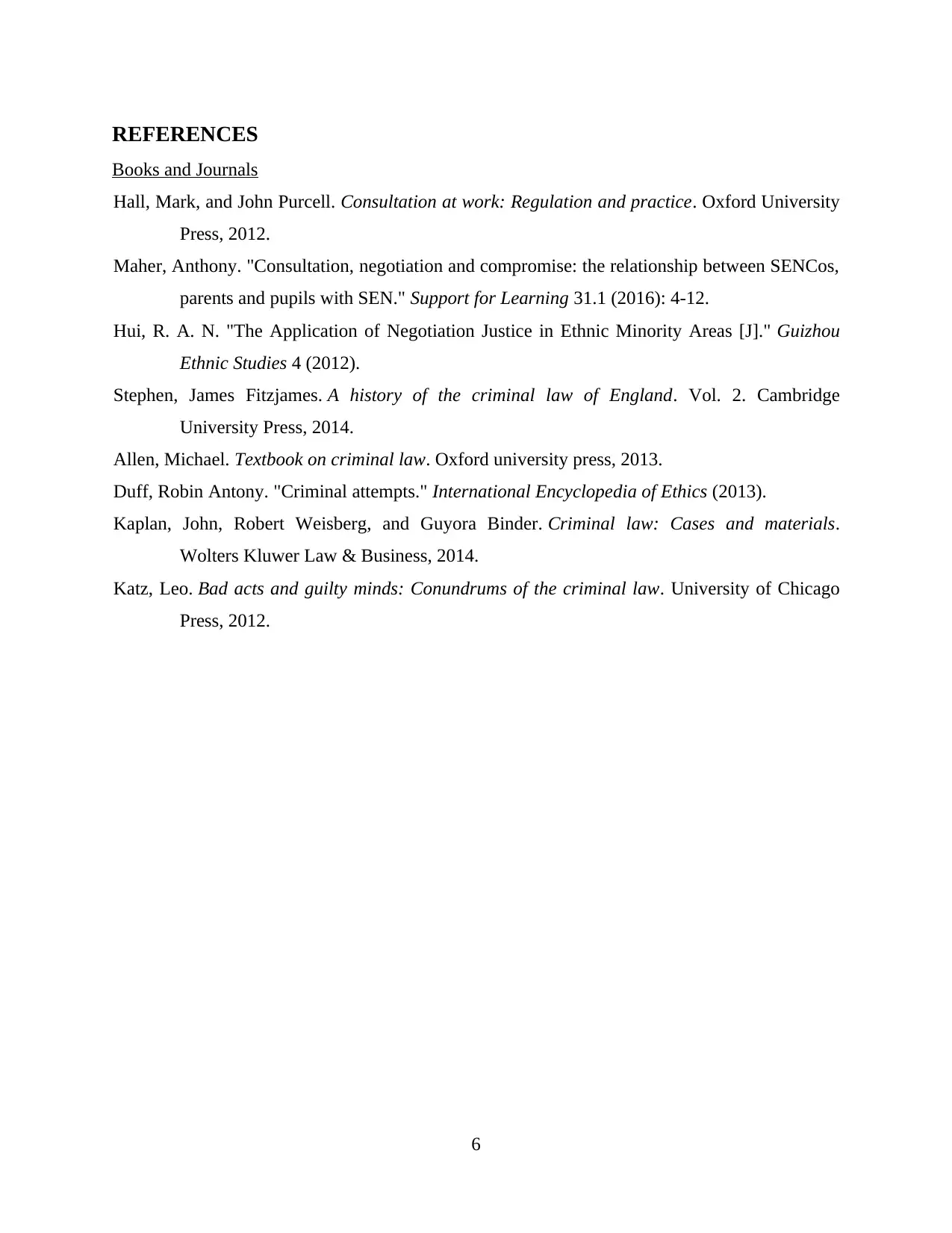
REFERENCES
Books and Journals
Hall, Mark, and John Purcell. Consultation at work: Regulation and practice. Oxford University
Press, 2012.
Maher, Anthony. "Consultation, negotiation and compromise: the relationship between SENCos,
parents and pupils with SEN." Support for Learning 31.1 (2016): 4-12.
Hui, R. A. N. "The Application of Negotiation Justice in Ethnic Minority Areas [J]." Guizhou
Ethnic Studies 4 (2012).
Stephen, James Fitzjames. A history of the criminal law of England. Vol. 2. Cambridge
University Press, 2014.
Allen, Michael. Textbook on criminal law. Oxford university press, 2013.
Duff, Robin Antony. "Criminal attempts." International Encyclopedia of Ethics (2013).
Kaplan, John, Robert Weisberg, and Guyora Binder. Criminal law: Cases and materials.
Wolters Kluwer Law & Business, 2014.
Katz, Leo. Bad acts and guilty minds: Conundrums of the criminal law. University of Chicago
Press, 2012.
6
Books and Journals
Hall, Mark, and John Purcell. Consultation at work: Regulation and practice. Oxford University
Press, 2012.
Maher, Anthony. "Consultation, negotiation and compromise: the relationship between SENCos,
parents and pupils with SEN." Support for Learning 31.1 (2016): 4-12.
Hui, R. A. N. "The Application of Negotiation Justice in Ethnic Minority Areas [J]." Guizhou
Ethnic Studies 4 (2012).
Stephen, James Fitzjames. A history of the criminal law of England. Vol. 2. Cambridge
University Press, 2014.
Allen, Michael. Textbook on criminal law. Oxford university press, 2013.
Duff, Robin Antony. "Criminal attempts." International Encyclopedia of Ethics (2013).
Kaplan, John, Robert Weisberg, and Guyora Binder. Criminal law: Cases and materials.
Wolters Kluwer Law & Business, 2014.
Katz, Leo. Bad acts and guilty minds: Conundrums of the criminal law. University of Chicago
Press, 2012.
6
⊘ This is a preview!⊘
Do you want full access?
Subscribe today to unlock all pages.

Trusted by 1+ million students worldwide
1 out of 9
Related Documents
Your All-in-One AI-Powered Toolkit for Academic Success.
+13062052269
info@desklib.com
Available 24*7 on WhatsApp / Email
![[object Object]](/_next/static/media/star-bottom.7253800d.svg)
Unlock your academic potential
Copyright © 2020–2025 A2Z Services. All Rights Reserved. Developed and managed by ZUCOL.





